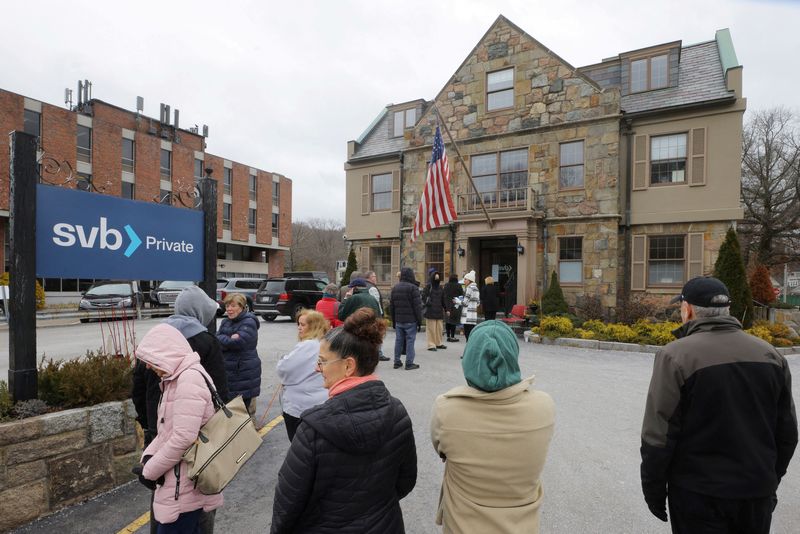Analysis-Some U.S. banks facing stock rout may need to seek partners
2023.03.14 01:01

© Reuters. Customers wait in line outside a branch of the Silicon Valley Bank in Wellesley, Massachusetts, U.S., March 13, 2023. REUTERS/Brian Snyder
By Nupur Anand, Tatiana Bautzer and David French
NEW YORK (Reuters) – Some U.S. regional banks are under pressure after the collapse of two lenders within days, with industry executives and advisers saying they could be forced to seek saviors if a rout in their stocks doesn’t let up.
U.S. regulators announced extraordinary measures on Sunday following the collapse of SVB Financial Group and Signature Bank (NASDAQ:), offering a safety net to banks pressured by fleeing depositors. On Monday, President Joe Biden vowed to take action to ensure the safety of the banking system.
But the intervention did little to prop up the banks’ shares, which slumped on Monday, posing a major impediment to growing their businesses and getting funding.
“If this continues to escalate you will have a liquidity drain from the mid to small banks,” said David Ellison, a portfolio manager at Hennessy Funds, which had a position in Signature Bank.
Raising private capital could help inspire confidence again in their stocks. Possible outcomes for under-pressure regional banks could see a stronger rival take over a weaker, or cash infusions from investors such as private equity, the industry sources said.
Over the weekend, some private equity firms had studied the possibility of an investment in banks whose shares plummeted such as First Republic Bank (NYSE:) and PacWest Bancorp, according to two industry sources with knowledge of the matter. They did not go ahead as the investors wanted to see what the government would do to alleviate pressure on the banking sector, the sources said.
With the emergency measures in place, those possibilities could be revived in the coming days.
First Republic declined comment. PacWest did not immediately respond to a request for comment after business hours.
One banking source said investors looking at banks that saw sharp declines in their share prices may want to wait a few days before they consider deals or cash infusions.
At that point, bank targets may be persuaded to do deals not because they need the liquidity, but to show they have the backings of large institutional investors.
There could be other ways for banks to try to shore up confidence, too. First Republic, for example, secured additional financing from JPMorgan Chase & Co (NYSE:), although that did not keep its stock from falling on Monday.
UNDER PRESSURE
Investors voted with their feet on Monday, putting bank stocks under pressure around the world. The KBW regional banking index fell 5.4% and the banking index dropped 6% in a chaotic day when several banks saw multiple trading halts because of the size of the moves.
Weighing on sentiment was the federal government’s statement that shareholders and certain unsecured debtholders would not be protected — something that might give investors in the banks pause.
“This is not a bailout. So investors think it’s a relative gamble staying around owning regional banks before knowing what will change in regulation,” said Brian Levitt, global market strategist for Invesco.
There are also other hurdles to deals. The Biden administration has taken a tough stance on deals over antitrust concerns and it is not clear whether they would be receptive to rescue transactions now.
Still, investors may find deals in the battered sector. Regional bank stocks are “an incredible bargain now,” billionaire investor Bill Ackman said on Twitter on Monday.
“There’s value in these banks, they are not all alike,” said Michael Farr, chief executive of investment advisory firm Farr, Miller & Washington who owns banks stocks including PNC and Truist. “You do your homework and see where real value exists.”








